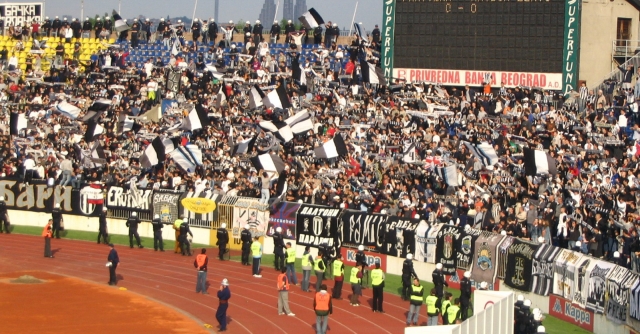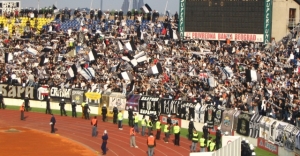Georgian Clubs Given Difficult European Assignments
Georgian football could certainly do with a lift but the chances of that arriving in the forthcoming Europa League and Champions League qualifiers appear slim after all four Georgian entrants were handed difficult ties in the respective draws on June 22 in Nyon, Switzerland.
In a week where revelations emerged that Georgian captain Jaba Kankava was wrongly made unavailable by the GFF for the recent qualifier against Poland, and ticket agency biletebi.ge crashed when attempting to sell Super Cup tickets, the draws for Georgia’s European hopefuls were scarcely mentioned.
Champions Dila Gori, making their first foray into the preliminary stages of the Champions League, were paired with Serbian champions Partizan Belgrade.
The Gori side, managed by 25-year-old Ucha Sosiashvili, will travel to the Partizan Stadium for the first leg on either the 14th or 15th of July, and will need to handle the notoriously intimidating home fans known as the Grobari (gravediggers) who are among the most volatile ultras in Eastern Europe.
Dila though have proved themselves to some extent in European competition in recent years, beating Danish pair Aarhus and Aalborg as well as Hajduk Split since 2012. The venue of the return leg has not been confirmed but is likely to be Tbilisi’s Mikheil Meskhi Stadium, with the fixture taking place on the 21st or 22nd of July.
Partizan reached the group stage of the Europa League last season but picked up only two points – each from goalless draws at home with Tottenham and Asteras Tripoli.
Before Dila launch into European action, three of their fellow Georgian clubs will play their first qualifying round ties.
Dinamo Tbilisi, Georgian Cup holders, face a local derby against Azerbaijan’s Gabala with the first leg at Dinamo Arena on July 2.
Compared to Dinamo, who won the Cup Winners’ Cup in 1981, Gabala are novices at this level having played only one European tie to date – a defeat to Bosnian side Siroki Brijeg at the same stage of last year’s Europa League qualifying.
Having finished third in the Azerbaijani top flight, Gabala, once managed by former Arsenal and England captain Tony Adams, are coached by Ukrainian Roman Hyhorchuk. A cosmopolitan squad contains a trio of Brazilians – midfielder Dodo, and defenders Ricradinho and Rafael Santos – and four Ukrainians.
Dinamo, who appointed the experienced Gia Geguchadze as head coach at the end of last season, will take on either Slovenia’s Domzale or Serbia’s Cukaricki in the second qualifying round if they can defeat the Azerbaijanis.
Meanwhile, Dinamo Batumi, making their first European appearance since 1998, were given the daunting challenge of Cypriot side Omonia Nicosia.
Omonia, whose squad contains Georgian international full-back Ucha Lobjanidze and former Celtic striker Cillian Sheridan, are strong favorites for the tie particularly having run money-laden Dinamo Moscow very close in the play-off round last season.
Dinamo, still homeless, have not confirmed where their home fixture – scheduled for July 2 - will be played but Kutaisi is the most likely location.
Completing the Georgian quartet are Spartaki Tskhinvali, playing in Europe for the first time in their history. A club from the occupied territory of South Ossetia, Tskhinvali have been playing in Tbilisi, and occasionally Gori, for several years. With no such thing as a “home” game, the Georgian debutants may be a worthwhile outside bet when they travel to face Romanian side FC Botosani.
Having finished 8th in the Romanian league, Botosani only entered the Europa League courtesy of a swathe of Romanian clubs failing to meet UEFA license criteria.
Located in the rural north of the country, Botosani are, like Tskhinvali, competing in Europe for the first time and have never achieved anything notable domestically in their 14-year history.
The victors will face Legia Warsaw in the following round and Romanian journalist Emanuel Rosu appeared to dismiss the Georgian challenge already, stating “I look forward to Legia Warsaw fans coming to Botosani, a real rural experience for them!”
It has been eleven years since a Georgian club reached the group stage of European competition, and the early missions assigned to this year’s hopefuls make it somewhat unlikely that that particular drought will end this summer.
Alastair Watt












